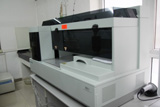What does Nausea Mean to Patients with Polycystic Kidney Disease
2014-03-24 14:15PKD is a hereditary and chronically progressive kidney disease characterized by numerous cysts with different sizes on both kidneys. It presents many symptoms and complications. Nausea is one symptoms of Polycystic Kidney Disease.
In the early stage, both the number and size of the cysts in the kidneys are small and patients can have no obvious symptoms or discomforts. The cysts are often detected by accident in tests for other diseases. Developing cysts can occupy the space of normal renal tissues. Kidney functions will gradually lost and develop into renal failure in the end.
Patients with Polycystic Kidney Disease experience different symptoms in different stages. So, what does nausea mean to patients with kidney diasease? Nausea is a symptom of patients with end-stage kidney disease. If patients with kidney disease experience nausea means their disease has progressed to stage 5—Uremia. At this stage, More than 85%-90% kidney functions have been lost. Some patients will have their kidneys removed and they have to rely on renal replacement therapies to maintain their life. Want to get personalized analysis about your prognosis? You can Email us at kidneyservice@hotmail.com.
Western medicine generally uses surgery, but the surgery unable stop continuous failure of kidney function, it is not a radical treatment. Then, Traditional Chinese Medicine is suggested to patients. But there are many cysts on kidneys, so kidneys are unable to absorb traditional Chinese medicine well. Micro-Chinese Medicine Osmotherapy is a treatment option for the patients with PKD. It has been applied to many patients and achieved good effects. This therapy can shrink the large cysts by inactivating the epithelial cells on cyst wall. On the other hand, the effective medicines can soften the cyst wall and improve the permeability of cyst wall to promote the excretion of cystic fluids, thus shrinking the large ones. Micro-Chinese Medicine Osmotherapy can treat PKD effectively and stop its progression. Thereby, the prognosis of PKD will be improved remarkably. Any questions? Chat with our online doctor now for free help.
Above all, Patients with Polycystic Kidney Disease should pay more attention to symptoms and receive treatment early. If they experience nausea, they must go to hospital immediately.
Any kidney problems? Please consult our online doctor. The satisfaction of patient is as high as 93%.
What you also want to know:
How can I get this treatment ?
How can I get this treatment in my counties ?
How much is this treatment ?
What is the duration if I receive this treatment in your hospital ?
How can I go to your hospital ?
Tag: Traditional Chinese Medicine PKD Basics Polycystic Kidney Disease and nausea
Pre: None
Next: Can Patients with PKD Pregnant
Leave a Message
Any questions?Fill the form below and we will surely attend to you within 24 hours.Free medical answers from experts!
About Hospital
Patient Story
- The Key Point In The Course Of Treatment
- Drinking More And Urinate Frequently Means Kidney Problems
- How To Deal With Occult Blood With Correct Methods.
















